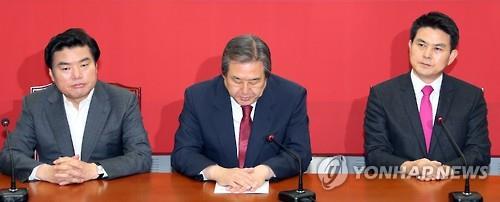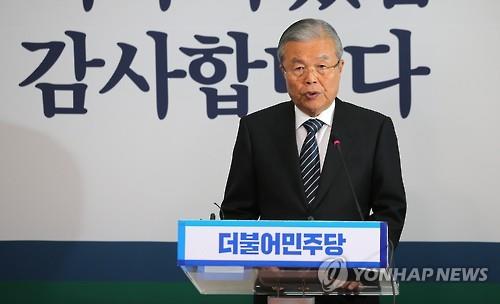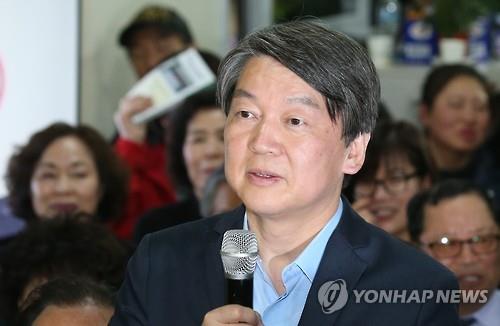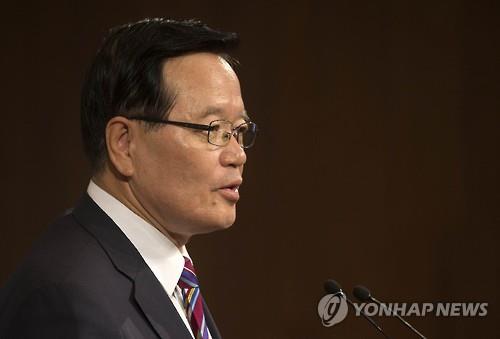- California Assembly OKs highest minimum wage in nation
- S. Korea unveils first graphic cigarette warnings
- US joins with South Korea, Japan in bid to deter North Korea
- LPGA golfer Chun In-gee finally back in action
- S. Korea won’t be top seed in final World Cup qualification round
- US men’s soccer misses 2nd straight Olympics
- US back on track in qualifying with 4-0 win over Guatemala
- High-intensity workout injuries spawn cottage industry
- CDC expands range of Zika mosquitoes into parts of Northeast
- Who knew? ‘The Walking Dead’ is helping families connect
Saenuri Party to convene emergency Supreme Council session to discuss its future

Saenuri Party leaders — Reps. Kim Moo-sung (C), Won Yoo-chul (L) and Kim Tae-ho — attend a ceremony marking the disbandment of the party’s election campaign committee at the National Assembly on April 14, 2016
SEOUL, (Yonhap) — The ruling Saenuri Party is set to convene an emergency session of its decision-making Supreme Council on Thursday afternoon to discuss how to move forward in the aftermath of its crushing defeat in Wednesday’s parliamentary elections.
During the session to be held in its headquarters in Yeouido, western Seoul, the party’s leaders are expected to discuss the formation of an emergency committee to steer the embattled party until members pick new leadership as early as next month.
Rep. Kim Moo-sung, the party’s chairman, and Rep. Kim Tae-ho — the two officials of the five-member Supreme Council — have offered to step down, taking responsibility for the resounding defeat in the elections where their party garnered only 122 of the 300 seats up for grabs.
Another two council members — Reps. Rhee In-je and Kim Eul-dong — failed to retain their parliamentary seats. Rep. Suh Chung-won, who retained his legislative post, is the only one available in the council.
In accordance with party rules, party floor leader Rep. Won Yoo-chul is to lead the emergency committee. But sources said the party could consider introducing an outsider for the job of reforming the party that suffered a serious factional division during the candidate nomination process.
Meanwhile, the main opposition Minjoo Party, which had struggled with its own issues, highlighted its rival Saenuri Party’s loss of a parliamentary majority as it emerged victorious from the elections.
Capitalizing on its triumph over the ruling party and government for “botched economic policies,” the Minjoo Party’s leader Kim Jong-in said the most substantial meaning of Wednesday’s elections was the fact that the Saenuri Party failed to retain its legislative majority.
“There are no political forces that can defeat the people. We once again realize the fearful authority of the voters’ minds,” he said during a press conference after his party won 123 seats in the 300-member National Assembly, one more seat than the ruling party.
“The voters delivered their stern judgment on the botched economic policies of the Park Geun-hye government and the Saenuri Party,” he added, urging the ruling camp to “realize” that the main cause of their defeat was a failure to improve the livelihoods of regular citizens.

Minjoo Party leader Kim Jong-in speaks during a press conference at the National Assembly on April 14, 2016.
Despite the electoral win, the Minjoo Party was not in a position to bask in the euphoria, Kim indicated, given that the election outcomes showed that the party had lost the backing of the country’s southwestern region, its traditional political bastion.
Out of the 28 total seats in the region, his party bagged only three. The fledgling People’s Party clinched 23 seats, rising as a formidable political force to be reckoned with.
“What goes around, comes around. We had always given only disappointment to the people in the region. It would be too brazen of us to call upon them to vote for us,” he said. “We will accept their minds and would like to say we are sorry again. We will do our best (to win back their minds).”
Rep. Moon Jae-in, the former leader of the Minjoo Party, said that it was “painful” to see that the party had lost the support of its traditional stronghold.
“I think people (in the region) used a stick in a move to encourage us to work harder,” he told reporters, pointing out that an opposition presidential candidate cannot win an election without support from the southwestern region.
“I think we should remain humble and make efforts (to woo them).”
Reeling from the election debacle, the leading members of the Saenuri Party offered to step down from their current in-house posts. Their resignations foreshadowed an imminent disbandment of the party leadership and a formation of an emergency panel that will lead the party to a leadership contest expected to be held as early as next month.
In the elections, the ruling party won only 122 seats, far short of the majority and well below the 180-seat mark that the party leadership dreamed of winning to be able to pass bills without the opposition’s consent.
Cheong Wa Dae said the electoral outcome well reflected “people’s demands” to enhance their livelihoods.
“(Cheong Wa Dae) hopes that the 20th National Assembly will become a new legislature that works for the people and takes care of people’s livelihoods,” presidential spokesman Jung Youn-Kuk said during a press briefing.
His remarks were seen as an implicit demand for the National Assembly to support the government’s drive for labor reform and economic revitalization.
In the wake of the defeat, speculation rose that President Park might conduct a personnel reshuffle — at least of her aides in charge of political affairs — in a move to show to the public her desire to better serve the people.
Rep. Ahn Cheol-soo, co-chair of the minority People’s Party, was seen as the biggest winner in the elections. His party won 38 seats, far more than the 20-seat requirement to form a parliamentary negotiating bloc.

Rep. Ahn Cheol-soo, co-chair of the minority People’s Party, speaks about his electoral win at his campaign office in Seoul on April 13, 2016.
The party pledged to become a “genuine representative” to realize people’s aspirations for a change in politics.
“We will pay back with the kind of politics that changes politics, the government and the lives of the people,” he said during a meeting with his party officials.
In an oblique reference to the politics beset by persistent factional feuds, regionalism and partisan backbiting, National Assembly speaker Chung Ui-hwa of the Saenuri Party said that the election outcome was voters’ warning against the “arrogance” of those in power and “retrogressing” democracy.
“I hope that by upholding people’s calls, the 20th National Assembly would carry out politics of genuine dialogue and compromise, and get parliamentary democracy to bloom,” he was quoted by his aides as saying.













